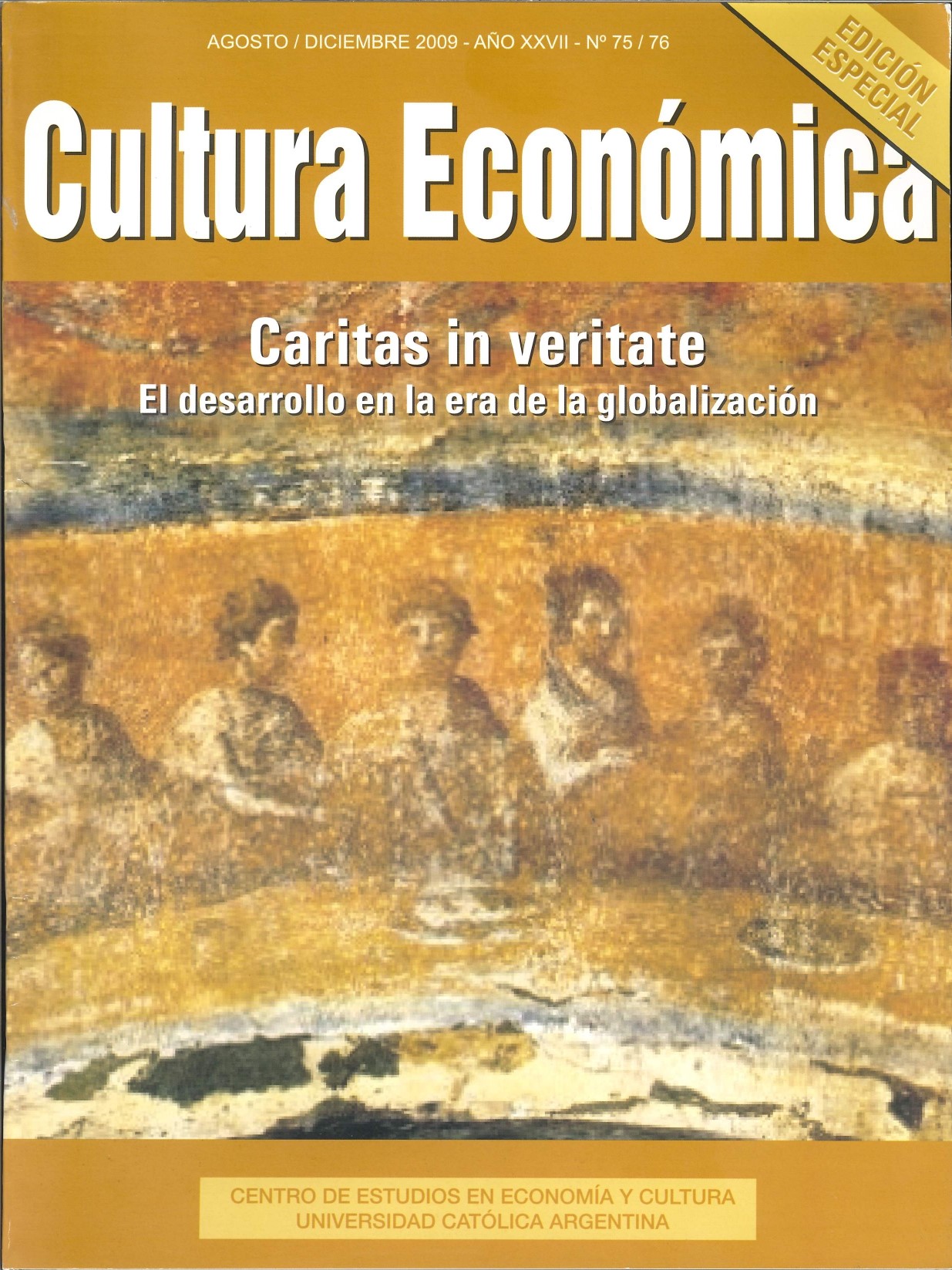Homo donator in Caritas in veritate
Keywords:
self-organization, gift, ethics, norms, justiceAbstract
The author analizes the gift economy presented in the Encyclical from different perspectives. In the first place, he addresses the concept of selforganization in relation to the market, community and State. Secondly, he presents a historical view of the gift. Thirdly, he relates justice with the gift economy and compares the treatment of the maximization and evolutionary theories. Finally, he shows the advantage of the gift economy in relation to the production of relational goods and proposes subsidizing donation till the corresponding social norm is
internalized.
Downloads
References
Becker, G. S. (1974), “A Theory of Social Interactions”, Journal of Political Economy. 82:1063-93.
Beito, D. T. (2000), From Mutual Aid to the Welfare State, Fraternal Societies and Social Services, 1890-1967, The University of North Carolina Press, Chapel Hill.
Beito, D. T.(2002), Gordon P. y Tabarrok, A. (2002), The Voluntary City. Choice, Community, and Civil Society, The University of Michigan Press, Ann Arbor.
Di Stefano, R. y otros (2002), De las cofradías a las Organizaciones de la Sociedad Civil. Historia de la Iniciativa Asociativa en la Argentina,
Edilab Editora, Buenos Aires.
Duby, G. (1973), Guerriers et Paysans, VII-XII siècle, Premier essor de l'économie européenne, Gallimard, Paris.
Etzioni, A. (1998), The Essential Communitarian Reader, Rowman & Littlefield Publishers, Lanham.
Gallo, E. (2002), Historia de la Beneficencia en el Buenos Aires Colonial, Ediciones Corregidor, Buenos Aires.
Godbout, J. T. (2000), Le Don, la Dette et l´Identité, Homo Donator vs Homo Economicus, La Decouverte, Paris.
Gudeman, S. (2001), The Anthropology of Economy, Blackwell Publishers, Malden, Mass.
Hardin, G. (1968), “The Tragedy of the Commons”, Science 162: 1243-8.
Homans, G. C. (1961), Social Behavior: Its Elementary Forms. Harcourt, Brace&World, Nueva York.
Kirzner, I. M. (1995), Creatividad, Capitalismo y Justicia Distributiva, Unión Editorial, Madrid.
Marrero, G. A. y Rodriguez, J. G. (2009), Inequality of Opportunity and Growth. Preliminary draft. ECINEQ meeting. Buenos Aires.
Mauss, M. (1950), “Essai sur le Don”, en Sociologie et Anthropologie, Presses Universitaires de France, París.
Nozick, R. (2001), Invariances, the Structure of the Objective World, Harvard University Press, Cambridge.
Pareto, V. (1916), Traité de Sociologie Générale, Droz, Génova.
Putnam, R. D. (1995), “Bowling Alone: America’s Declining Social Capital” Journal of democracy. Vol 6, N 1.
Rawls, J. (1971) A Theory of Justice, Cambridge, The Belknap Press of Harvard University Press, Cambridge.
Rege, M. (2004), “Social Norms and Private Provision of Public Goods”, Journal of Public Economic Theory, 6 (1): 65-77.
Rubio de Urquía, R. (1994), Ética, mercado y negocios, Doménech Melé Carné (comp.), E.U.N.S.A., Pamplona.
Rubio de Urquía, R. (2003), “Estructura fundamental de la explicación de procesos de autoorganización mediante modelos teórico-económicos”, Cap. 1 en Rubio de Urquía, R., Vázquez, F. y Muñoz Pérez, F. (2003), Procesos de Autoorganización, Instituto de Investigaciones Económicas
y Sociales “Francisco de Vitoria”, Unión Editorial, Madrid.
Samuelson, P. A. (1954), “The Pure Theory of Public Expenditure”, Review of Economics and Statistics, 387-389.
Smith, A. (1759), La Teoría de los Sentimientos Morales, Alianza Editorial, Madrid.
Smith, A. (1776), Investigación sobre la Naturaleza y causas dela Riqueza de las Naciones, Fondo de Cultura Económica, México.
Sugden, R. (1982), “On the Economics of Philanthropy”, The Economic Journal, Vol. 92, Nº 366: 341-350.
Tocqueville, A. (1835), De la Démocratie en Amérique, Gallimard, Paris, 1961.
Uhlaner, C. J. (1989.), “Relational Goods and Participations: Incorporating Sociability into a Theory of Rational Action”, Public Choice, 62, (3): 253-85.
Vara Crespo, O. y Rodríguez García-Brazales, A. (2003), “El Concepto de
Autoorganización en Carl Menger y en Friedrich A. Hayek” Cap. 6 en Rubio de Urquía, R., Vázquez, F. Y Muñoz Pérez, F. (2003), Procesos de Autoorganización, Instituto de Investigaciones Económicas y Sociales “Francisco de Vitoria”, Unión Editorial, Madrid.
Warr, P. G. (1982), “Pareto Optimal Redistribution and Private Charity”, Journal of Public Economics. 19:131-138.
Zajac, E. (1995), Political Economy of Fairness, The MIT Press, Cambridge.
Zemborain, L. (2009), “Las manos invisibles del bienestar. Un modelo evolutivo de redistribución voluntaria”, Tesis Doctoral, Universidad Católica Argentina.
Downloads
Published
How to Cite
Issue
Section
License













